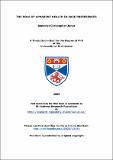Files in this item
The role of apparent health in face preferences
Item metadata
| dc.contributor.advisor | Perrett, David | |
| dc.contributor.author | Jones, Benedict Christopher | |
| dc.coverage.spatial | 160 p. | en_US |
| dc.date.accessioned | 2018-04-16T13:34:49Z | |
| dc.date.available | 2018-04-16T13:34:49Z | |
| dc.date.issued | 2005-06 | |
| dc.identifier.uri | https://hdl.handle.net/10023/13144 | |
| dc.description.abstract | This thesis describes a series of empirical studies that investigated the role of apparent health in face preferences. Chapter 1 summarises previous work showing that facial symmetry, averageness and sexual dimorphism influence judgements of facial attractiveness. Chapter 2 describes studies demonstrating that consideration of the role of apparent health in face preferences offers insight into the motivations that underpin attraction to symmetric faces. Chapters 3-5 describe studies demonstrating that, while people generally prefer faces that appear healthy to those that appear unhealthy, characteristics of the judges (e.g. hormonal, health and developmental factors) contribute to systematic variation in women's preferences for apparent health. In the final chapter, a positive link between lifestyle health (e.g. exercise behaviour) and facial health was demonstrated. The findings described in this thesis are evidence that preferences for healthy faces are influenced by biological factors and evidence for accuracy in attributions of health to faces. | en_US |
| dc.language.iso | en | en_US |
| dc.publisher | University of St Andrews | |
| dc.subject.lcc | BF859.J7 | |
| dc.subject.lcsh | Interpersonal attraction. | en |
| dc.subject.lcsh | Face perception. | en |
| dc.title | The role of apparent health in face preferences | en_US |
| dc.type | Thesis | en_US |
| dc.type.qualificationlevel | Doctoral | en_US |
| dc.type.qualificationname | PhD Doctor of Philosophy | en_US |
| dc.publisher.institution | The University of St Andrews | en_US |
This item appears in the following Collection(s)
Items in the St Andrews Research Repository are protected by copyright, with all rights reserved, unless otherwise indicated.

